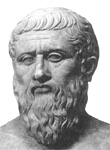Chapter 1. "Art as Imitation and the Form of Beauty" by Plato

Plato adapted from University of St. Andrews
About the work …
In his Book X of The Republic,[1] Plato argues that artists and poets threaten the stability of an ideal government, and the works of painters, musicians, and poets should be censored since they can irrationally inflame the passions of the populace. Even so, he thought the arts, if carefully controlled, could help mold the character of the young. In this selection from Book X, Socrates explains how the artist and poet simply and imperfectly imitate the everyday world of sensations and appearances which are in turn merely poor copies of the unchanging "real" world of perfect essences. For Plato, the good life, is a life spent in the rational pursuit of universal knowledge. Such a pursuit, he thinks, can be achieved in an ideal society where philosophers become kings. In the selection from The Symposium,[2] Diotoma explains to Socrates that the desire for beauty is the ultimately part of the quest for attaining our immortality by means of "giving birth" to such eternal goods as virtue and wisdom.
Ideas of Interest from The Republic and The Symposium
Explain what Socrates means by the Ideas or Forms of things. What kinds of Ideas or Forms exist?
Why, according to the argument put forward by Socrates, cannot there be ideal or real things in the world of appearances or in art?
How does Socrates prove that artists lack concern for truth?
What are the two principles of soul discussed by Socrates? What do artists and poets have in common?
Why does Socrates believe poetry to be dangerous?
What does Diotima mean when she says "Love [is] neither fair nor good"?
Why is beauty to be desired? How does Diotima define love?
According to Diotima, what is the source of wisdom, beauty, temperance, and justice?
How does Diotima describe the attainment of the reality and essence of beauty?